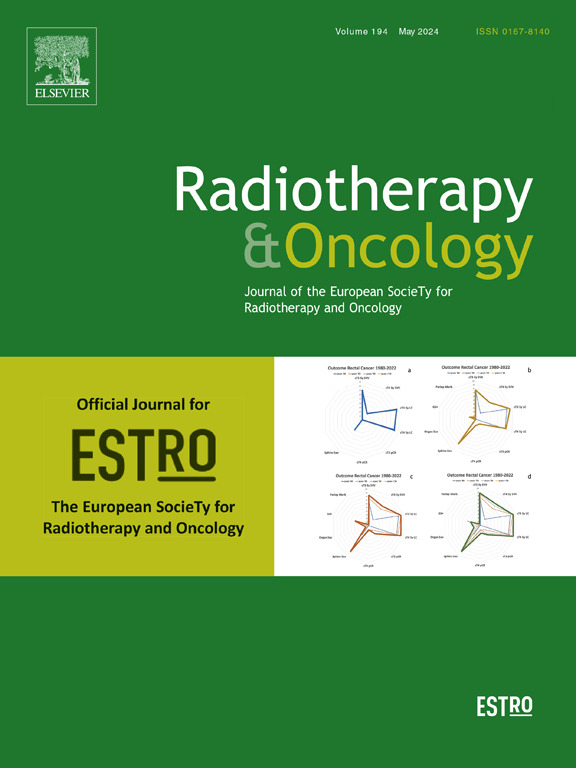Evaluating ChatGPT’s competency in radiation oncology: A comprehensive assessment across clinical scenarios
IF 4.9
1区 医学
Q1 ONCOLOGY
引用次数: 0
Abstract
Purpose
Artificial intelligence (AI) and machine learning present an opportunity to enhance clinical decision-making in radiation oncology. This study aims to evaluate the competency of ChatGPT, an AI language model, in interpreting clinical scenarios and assessing its oncology knowledge.
Methods and Materials
A series of clinical cases were designed covering 12 disease sites. Questions were grouped into domains: epidemiology, staging and workup, clinical management, treatment planning, cancer biology, physics, and surveillance. Royal College-certified radiation oncologists (ROs) reviewed cases and provided solutions. ROs scored responses on 3 criteria: conciseness (focused answers), completeness (addressing all aspects of the question), and correctness (answer aligns with expert opinion) using a standardized rubric. Scores ranged from 0 to 5 for each criterion for a total possible score of 15.
Results
Across 12 cases, 182 questions were answered with a total AI score of 2317/2730 (84 %). Scores by criteria were: completeness (79 %, range: 70–99 %), conciseness (92 %, range: 83–99 %), and correctness (81 %, range: 72–92 %). AI performed best in the domains of epidemiology (93 %) and cancer biology (93 %) and reasonably in staging and workup (89 %), physics (86 %) and surveillance (82 %). Weaker domains included treatment planning (78 %) and clinical management (81 %). Statistical differences were driven by variations in the completeness (p < 0.01) and correctness (p = 0.04) criteria, whereas conciseness scored universally high (p = 0.91). These trends were consistent across disease sites.
Conclusions
ChatGPT showed potential as a tool in radiation oncology, demonstrating a high degree of accuracy in several oncologic domains. However, this study highlights limitations with incorrect and incomplete answers in complex cases.
评估 ChatGPT 在放射肿瘤学方面的能力:跨临床场景的综合评估。
目的:人工智能(AI)和机器学习为加强放射肿瘤学的临床决策提供了机会。本研究旨在评估人工智能语言模型 ChatGPT 在解释临床场景和评估其肿瘤学知识方面的能力:设计了一系列临床案例,涵盖 12 种疾病。问题按领域分组:流行病学、分期和检查、临床管理、治疗计划、癌症生物学、物理学和监测。皇家学院认证的放射肿瘤专家(ROs)对案例进行审核并提供解决方案。放射肿瘤学家根据 3 个标准对答案进行评分:简洁性(答案重点突出)、完整性(涉及问题的所有方面)和正确性(答案与专家意见一致)。每项标准的得分从 0 到 5 分不等,总分为 15 分:在 12 个案例中,共回答了 182 个问题,人工智能总分为 2317/2730(84%)。各标准的得分分别为:完整性(79%,范围:70-99%)、简洁性(92%,范围:83-99%)和正确性(81%,范围:72-92%)。人工智能在流行病学(93%)和癌症生物学(93%)领域表现最佳,在分期和检查(89%)、物理学(86%)和监测(82%)领域表现尚可。较弱的领域包括治疗计划(78%)和临床管理(81%)。统计差异是由完整性的差异造成的(P 结论:ChatGPT 显示了其作为一种工具的潜力:ChatGPT 显示出作为放射肿瘤学工具的潜力,在多个肿瘤学领域显示出高度的准确性。不过,这项研究也强调了复杂病例中不正确和不完整答案的局限性。
本文章由计算机程序翻译,如有差异,请以英文原文为准。
求助全文
约1分钟内获得全文
求助全文
来源期刊

Radiotherapy and Oncology
医学-核医学
CiteScore
10.30
自引率
10.50%
发文量
2445
审稿时长
45 days
期刊介绍:
Radiotherapy and Oncology publishes papers describing original research as well as review articles. It covers areas of interest relating to radiation oncology. This includes: clinical radiotherapy, combined modality treatment, translational studies, epidemiological outcomes, imaging, dosimetry, and radiation therapy planning, experimental work in radiobiology, chemobiology, hyperthermia and tumour biology, as well as data science in radiation oncology and physics aspects relevant to oncology.Papers on more general aspects of interest to the radiation oncologist including chemotherapy, surgery and immunology are also published.
 求助内容:
求助内容: 应助结果提醒方式:
应助结果提醒方式:


